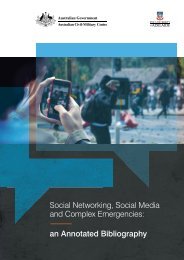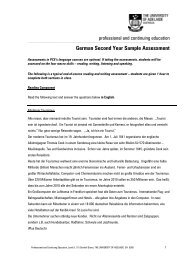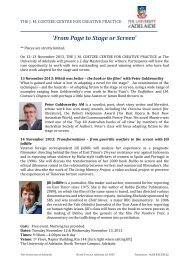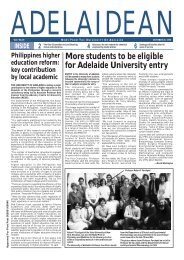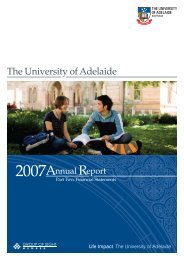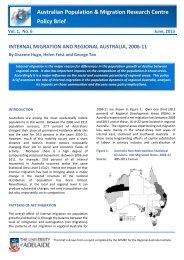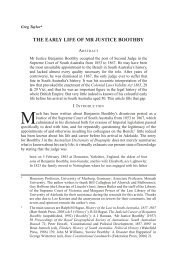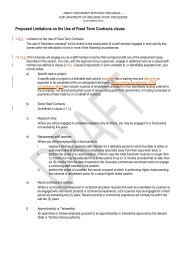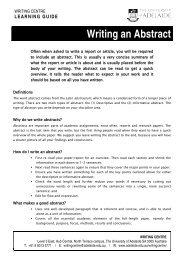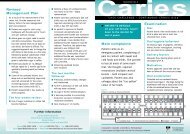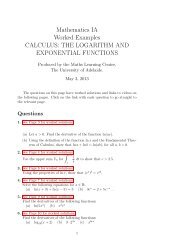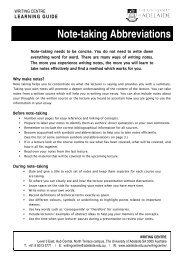Unbridling the Tongues of Women - The University of Adelaide
Unbridling the Tongues of Women - The University of Adelaide
Unbridling the Tongues of Women - The University of Adelaide
You also want an ePaper? Increase the reach of your titles
YUMPU automatically turns print PDFs into web optimized ePapers that Google loves.
<strong>Unbridling</strong> <strong>the</strong> tongues <strong>of</strong> women<br />
employment for those family members willing to work. He also had thoroughly paternalist<br />
punitive powers; it needed only his report to condemn <strong>the</strong> idle, <strong>the</strong> gambler<br />
or <strong>the</strong> drunkard to a term <strong>of</strong> imprisonment with hard labour. Octavia Hill translated<br />
<strong>the</strong> ‘fa<strong>the</strong>rs’ into Lady rent collectors; Spence turned <strong>the</strong>m into gender-neutral ‘Helpers’.<br />
55 It was her support for <strong>the</strong> idea <strong>of</strong> <strong>the</strong> Elberfeld system which provided Daniels<br />
with <strong>the</strong> key point in her analysis <strong>of</strong> Spence’s voluntary welfare work as assisting <strong>the</strong><br />
extension <strong>of</strong> middle-class interference in <strong>the</strong> lives <strong>of</strong> <strong>the</strong> working class. 56<br />
Yet <strong>the</strong> o<strong>the</strong>r main point in Daniels’s argument maintains that <strong>the</strong> attitudes<br />
which Spence expressed in such work derived from her identification with <strong>Adelaide</strong>’s<br />
urban intelligentsia. This is less easily sustained. Her later refusal to align<br />
herself, as Daniels notes, with <strong>the</strong> political parties <strong>of</strong> ei<strong>the</strong>r capital or labour, and<br />
her advocacy <strong>of</strong> political rights for minorities, certainly may have taken colouring<br />
from her membership <strong>of</strong> <strong>the</strong> educated Unitarian congregation. Unitarians were well<br />
represented in her initial venture into welfare work: four <strong>of</strong> <strong>the</strong> eleven members <strong>of</strong><br />
<strong>the</strong> first Boarding-Out Society committee were members <strong>of</strong> that church, and ten<br />
<strong>of</strong> <strong>the</strong> Society’s first 18 subscribers were connected with it. 57 But by <strong>the</strong> 1880s and<br />
1890s, Spence’s views had already moved away from those <strong>of</strong> at least some <strong>of</strong> <strong>the</strong><br />
members <strong>of</strong> her church. It seems quite as likely, if not more so, that Spence’s concern<br />
with minority interests was, during <strong>the</strong> last decades <strong>of</strong> her life, an expression <strong>of</strong> her<br />
identification with a minority interest to which she had belonged all her days. Her<br />
concern with compulsory providence can be seen as a response to <strong>the</strong> needs <strong>of</strong> aged<br />
married women who had spent <strong>the</strong>ir lives being economically dependent on wageearning<br />
husbands. Her endorsement <strong>of</strong> <strong>the</strong> Elberfeld system focused not so much<br />
on its interventionary aspects as on <strong>the</strong> criticism for which her account <strong>of</strong> Elberfeld<br />
serves as introduction: <strong>of</strong> <strong>the</strong> South Australian government’s meanness with <strong>the</strong> rations<br />
provided as out-relief, <strong>of</strong> its policy <strong>of</strong> refusing rations to <strong>the</strong> families <strong>of</strong> men out<br />
<strong>of</strong> work, and <strong>of</strong> <strong>the</strong> problems that women in paid work faced in supporting families.<br />
Her work with <strong>the</strong> Boarding-Out Society and <strong>the</strong> State Children’s Council was intended<br />
to provide strong cohesive bonds, as she explained, between ‘<strong>the</strong> unfortunate<br />
members <strong>of</strong> <strong>the</strong> working-class’ and ‘<strong>the</strong> comparatively prosperous <strong>of</strong> that class’. 58 She<br />
was hostile to <strong>the</strong> idea <strong>of</strong> boarding out children from Magill with wealthy families,<br />
and she considered it worthy <strong>of</strong> not only notice, but approval, that in <strong>the</strong> boarding<br />
out ‘movement’, ‘<strong>the</strong> rich and <strong>the</strong> great <strong>of</strong> <strong>the</strong> colony have taken a very subordinate<br />
place’. In both cases it was <strong>the</strong> solidarity, cohesiveness and mutual responsibility <strong>of</strong><br />
sections <strong>of</strong> <strong>the</strong> working class that she saw at stake. 59<br />
90



